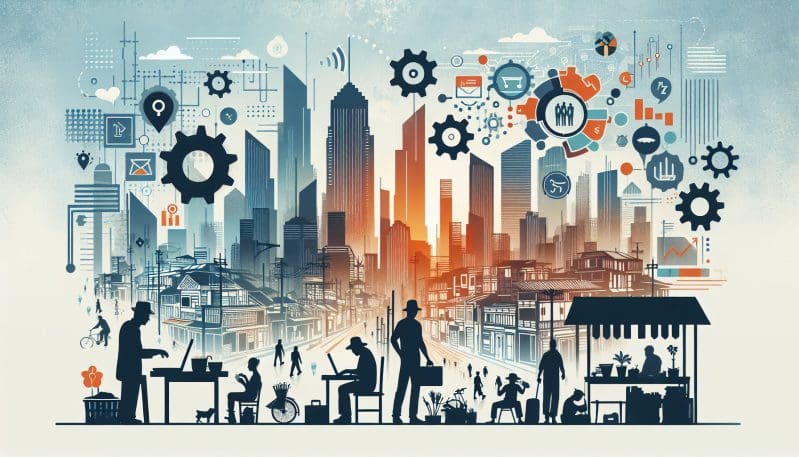The Future of Work: Addressing the Informal Economy Challenge
- Home
- The Future of Work: Addressing the Informal Economy Challenge

- Editors Desk
- January 12, 2024
- 0 Comments
As the global economy evolves, an increasing spotlight shines on a sector that often escapes the regular scrutiny of economic indicators and workforce statistics: the informal economy. Accounting for a substantial slice of the world’s labor force, the informal economy represents a vast array of workers who operate outside the formal structures of employment, lacking legal protections, social security, and inclusion in workplace advancements.
The informal economy includes a diverse range of occupations, from street vendors and domestic workers to freelance artisans and unregistered business proprietors. While the informal sector offers opportunities for livelihoods to many who might otherwise be unemployed, it also encapsulates a host of challenges that impact both individuals and the broader economic landscape.
Let’s delve into the realities faced by the legions of informal workers around the globe, examine the implications of this often overlooked segment, and explore innovative solutions for a more inclusive and secure future of work.
Vulnerabilities of the Informal Economy
The informal workforce is characterized by a high degree of vulnerability. Without formal contracts or recognition by the state, these workers have little to no legal recourse in disputes, they are often excluded from labor laws, and they cannot benefit from social protection mechanisms such as health insurance, pension schemes, and unemployment benefits. This precarious position leaves them at the mercy of economic fluctuations and crises, like the recent COVID-19 pandemic, which disproportionately affected informal workers with devastating effects on their incomes and welfare.
Implications for Workers’ Rights and Social Security
The lack of formalization in the informal sector means that workers’ rights are frequently neglected. Informal workers are often victims of exploitation, including unfair wages, excessively long working hours, and unsafe working conditions. Furthermore, the absence of social security exacerbates their insecurity, as they have no safety net in times of illness, injury, or retirement, pushing many into a cycle of poverty.
Inclusion and the Future Workplace
As the world grapples with unprecedented changes, including technological advancements, climate change, and demographic shifts, the informal economy cannot be left behind. For the future workplace to be inclusive, it needs to recognize and integrate these workers, ensuring they are part of the evolving labour dynamics.
Innovative Solutions for Integration
The integration of informal workers into the formal economy requires innovative and multifaceted approaches that consider the complex socio-economic dynamics at play. Solutions could include:
1. Legal recognition and registration of informal businesses to bring them into the economic mainstream.
2. Simplifying formalization processes, making them more accessible and less costly for informal workers.
3. Establishing legal frameworks that provide for gradual formalization, enabling informal workers to access benefits and protections in stages.
4. Encouraging associations and cooperatives that can provide informal workers with a collective voice and bargaining power.
5. Implementing education and training programs to improve skills and employability in formal sectors.
6. Offering financial incentives and social protection packages to ease the transition into formal employment.
Conclusion
Addressing the challenges of the informal economy is not only a matter of social justice but also a strategic economic imperative. By integrating informal workers into the fabric of the formal economy, we can create a more resilient and equitable workforce for everyone. No Worker Left Behind believes that with collaboration between governments, the private sector, and civil society, we can forge a future of work that leaves no one behind.
The informal economy, with all its complexities, is a puzzle that we must solve collectively. It’s a pursuit that demands ingenuity, compassion, and a steadfast commitment to the notion that every worker deserves a chance to thrive under the dignified umbrella of formal employment. It’s time to reimagine and reshape the landscape of work to truly include and uplift every member of our global workforce.
Choose Layout
Main Color Scheme
- RTL Version
- LTR Version
